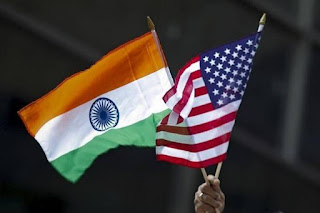Revelations of the 'Social realities of Indian Americans' report
Indian Americans form the second-largest settlement group in
the United States of America. The Indian American Attitudes Survey and YouGov,
a research and analytics company, surveyed 1,200 Indian Americans. The result
was published jointly by Carnegie Endowment for International Peace, University
of Pennsylvania and Johns Hopkins University (SAIS).
Swearing in as the President of the United States, Joe Biden
stated “Indian –of-descent Americans are taking over the country.” President
Joe Biden mentioned the brining of ‘solitary culture’ in the United States of
America. Many key roles in Biden’s administration were given to the Indian
Americans including Kamala Harris and Vinay Reddy.
The Indian American attitudes survey highlighted that thirty
per cent of Indian Americans identify discrimination as a major issue in
America. The skin color and gender were identified as the major factors
contributing to discrimination. Interestingly, ‘country of origin’ also rooted
as a factor for discrimination.
Religion and caste system impose a divide, not only in India
but also in the United States. Religion, caste and specifically race pose a
serious threat to humanitarianism. According to the survey, a higher number of
Indian Americans believe that religion plays a key role in their lives. Interaction
or communication of Indian Americans is homogenous. They tend to stick with their
social communities.
The marginalized communities in the US, based on their
caste, are vulnerable to inequality or bias. In contrast to the appointment of
officers for administration, marginalized communities in the US are subject to
discrimination at the workplace. The report highlighted a lawsuit against Cisco
systems filed in the year 2020. An employee belonging to a marginalized caste
community was victimized by his colleagues, who were Indian Americans.
Speaking of education, the majority of the Indian Americans
either completed their education or had their undergraduate degree before
immigrating to the US.
The individuals are confined to their culture and norms,
just like tracing the times of history. Endogamy is largely found in the first
and second generations of the Indian American population in the US. However,
the survey also revealed an increase in inter-community marriages in the second
generation population.
Although the population is said to have diverse cultures or religion,
the majority of the respondents belonged to the Hindu community. Muslims,
Christians and others were a religious minority. When questioned on
‘self-identity, the term ‘Indian American’ and ‘Indian’ has gained a large
number of responses. Self-identification also based on their religion. The
report showed that Hindus would prefer to be identified as ‘Indians’ while
Christians are likely to identify as ‘Americans.’
The report also revealed that civil and political engagement
was higher among the US-born. Networking of individuals or socialization
continues to be homogenous in the US, politically, economically and socially.

No comments:
Post a Comment